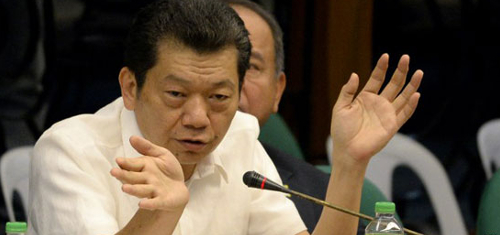 Philippine officials heard conflicting testimony on Tuesday regarding the origins and current whereabouts of the $81m stolen from Bangladeshi central bank accounts and funneled through local casino operators.
Philippine officials heard conflicting testimony on Tuesday regarding the origins and current whereabouts of the $81m stolen from Bangladeshi central bank accounts and funneled through local casino operators.
On Tuesday, the Philippine Senate conducted its latest hearing into the missing millions, which were stolen from Federal Reserve Bank of New York accounts last month by as yet unidentified hackers.
The scandal has roped in local casino and junket operators, as well as the Rizal Commercial Banking Corporation (RCBC) and foreign remittance firm Philrem Services Inc.
Tuesday’s star witness was Kam Sin ‘Kim’ Wong (pictured), a Chinese junket operator residing in the Philippines. Wong claimed two Chinese junket agents – Gao Shu Hua from Beijing and Ding Zhi Ze from Macau – were responsible for bringing the money into the Philippines via accounts they arranged with RCBC manager Maia Santos-Deguito.
Wong said he’d known Gao for years but was introduced to Ding via Gao only recently. Wong claimed that the men told him they were looking to invest in the local junket industry and the transferred money came via the closure of their Macau operations as well as proceeds from a Chinese land sale. Wong said his only role in the transfers was serving as an interpreter when the men opened the accounts (in the names of five fictitious individuals, as it turned out).
Wong’s testimony differs from that offered by Deguito to the Senate last week, in which she identified Wong as the person who instructed her to open the RCBC accounts. Wong testified that he introduced Gao to Deguito last May to discuss opening accounts with RCBC.
WHO’S GOT WHAT
Wong said he’s willing to return $4.63m still sitting in a junket account at Solaire Resort and Casino to the money’s rightful owners. Representatives from Bloomberry Resorts, the operator of Solaire, told the hearing that the casino had frozen $2.33m in gamblers’ accounts following news of the bank heist.
Wong said a further $863k remained in an account registered to his company, Eastern Hawaii Leisure Co, at the Midas Hotel casino in Manila. Wong also said he’s willing to return $9.71m that he claims Gao paid him to cover an earlier gambling debt.
Wong further claimed that $17m is still with Philrem, although Philrem president Salud Bautista denied his company had this sum on hand. Bautista insisted that his company had delivered a total of $18m to Weikang Xu, another central figure in the case, whose whereabouts remain unknown.
On Monday, Philippine authorities announced that they’d obtained a copy of Xu’s Chinese passport. Officials at Solaire have disputed reports that Xu was a junket operator, calling him a “mere gambler.” The Philippines Anti-Money Laundering Council (AMLC) has filed criminal complaints against Xu and Wong, and is also seeking Chinese help in tracking down Gao and Ding.
Wong also testified as to the specifics of his junket deals with Philippine casinos. The Philippine Amusement and Gaming Corporation (PAGCOR), which runs the Midas Hotel, gets 26.5% of Wong’s junket earnings. Wong’s deal with Solaire is more favorable to the casino, which pockets 52.5% of junket customer losses.
PHILIPPINES BANKING LAWS CALLED INTO QUESTION
John Gomes, Bangladesh’s ambassador to Manila, said he welcomed Wong’s offer to return some of the purloined cash, calling it a “positive step.” Gomes also thanked the Philippine senate for continuing to press the issue.
Philippine casinos aren’t subject to the country’s anti-money laundering laws, an omission that has politicians crying for an immediate legislative rewrite to restore the country’s image in the eyes of the world’s financial services industry.
RCBC’s legal and regulatory chief Maria Celia Estavillo earned the senators’ ire on Tuesday after she testified that she couldn’t provide info on the accounts in question as the Bank Secrecy Act “does not allow us to speak about these deposits.”
When senators pointed out that the accounts had been opened under fictitious names and thus there was “nobody’s privacy to protect,” Estavillo said the law also protected the deposit itself, and until there was a legal determination that the money in the accounts was stolen, she was bound by secrecy provisions.
